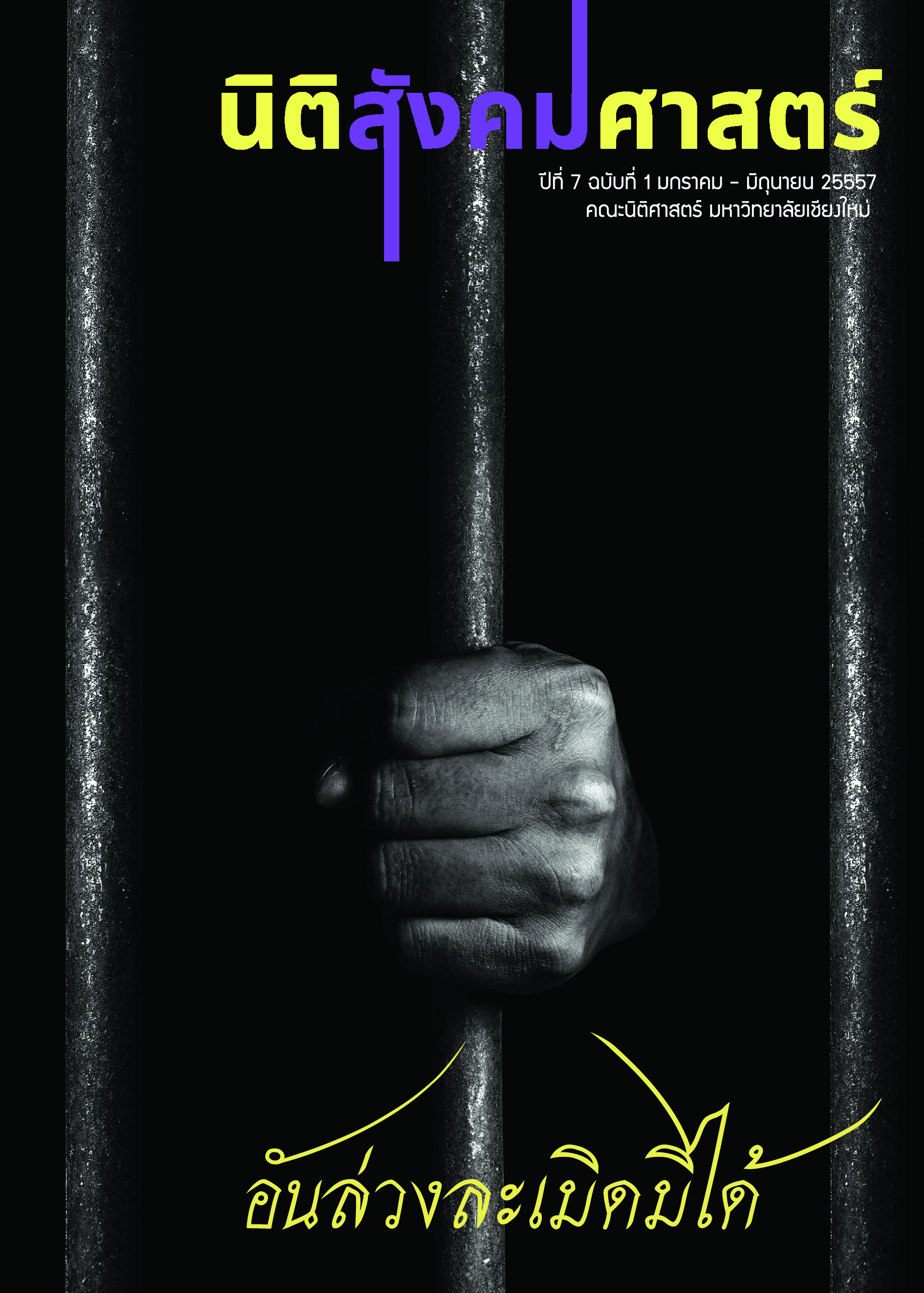สื่อโป๊ : การแสดงความคิดเห็นต้องห้ามและประชาธิปไตย
Main Article Content
บทคัดย่อ
ประวัติศาสตร์ของมนุษยชาติได้สะท้อนความจริงให้เห็นว่าเทคโนโลยีสื่อใหม่ๆ เช่น ฟิล์ม เคเบิลทีวี วีดีโอ วีซีดี ดีวีดี และ ล่าสุด อินเทอร์เน็ต ได้ถูกใช้เพื่อบันทึกกิจกรรมทางเพศและเผยแพร่ภาพบันทึกเหล่านั้นทั้งในรูปแบบของภาพนิ่งและภาพเคลื่อนไหว ภาพบันทึกทางเพศเหล่านี้รู้จักกันโดยทั่วไปว่า “สื่อโป๊”[1](สื่อโป๊ในที่นี้หมายถึงสื่อโป๊ผู้ใหญ่ ไม่รวมสื่อโป๊เด็ก หรือ child pornography) บทความนี้มุ่งที่อธิบายความสัมพันธ์ระหว่างสื่อโป๊และประชาธิปไตยจากมุมมองเชิงทฤษฎี โดยเริ่มด้วยการตั้งข้อถกเถียงว่าที่จริงแล้วสื่อโป๊เป็นรูปแบบหนึ่งของการแสดงความคิดเห็น หรือจะกล่าวให้ชัดลงไปอีก คือ สื่อโป๊ถือเป็นการแสดงความคิดเห็นในเรื่องทางเพศ และเช่นเดียวกับการแสดงความคิดเห็นประเภทอื่นๆ สื่อโป๊ก็มีบทบาทของของตัวเองภายใต้กรอบแนวคิดประชาธิปไตยและที่สำคัญบทความนี้พยายามที่จะชี้ให้เห็นว่าบรรทัดฐานสื่อลามกที่วางโดยศาลฎีกามองข้ามข้อความและความคิดเห็นที่สื่อออกมาจากสื่อโป๊ และภายใต้บรรทัดฐานดังกล่าวความคิดเห็นที่นำเสนอโดยสื่อโป๊นั้นแทบไม่มีพื้นที่ภายใต้กฎหมายสื่อลามกไทย และสิ่งนี้ดูเหมือนจะไม่สอดคล้องกับหลักการเสรีภาพในการแสดงความคิดเห็นของสังคมประชาธิปไตย
สื่อโป๊; กฎหมายสื่อลามก; การแสดงความคิดเห็น; และประชาธิปไตย
Humanity’s history has reflected the truth that the newly developed media technologies – such as films, cable television, videos, VCDs, DVDs and, the most recently, the Internet – have been used to record sexual activities and disseminate suchsexually explicit images in the form of still and motion pictures – which are normally known as ‘pornography’ (i.e. for the purpose of the discussion, pornography referred in paper is adult pornography, excluding child pornography). This paperaims to explain the relationship between pornography and democracy from a theoretical perspective, by arguing that pornography could be considered as a form of expression – i.e. sexual expression. Like other categories of expression, sexual expression has a role to play in the conceptual framework of democracy. Furthermore,importantly, it points out that– as a matter of principle –obscenity standard in Thailand laid down by the Supreme Court of Thailandseems to ignore messages and opinions communicated by pornography. As a result, under the Thai obscenity law, there is no room for opinions imparted from pornography. This would be inconsistent with the principle of freedom of expression in a democratic society.
Pornography; Obscenity law; Expression and Democracy
Article Details
O ความคิดเห็นใดๆ ที่ลงตีพิมพ์ใน CMU Journal of Law and Social Sciences เป็นของผู้เขียน (ความคิดเห็นใดๆ ของผู้เขียน กองบรรณาธิการ CMU Journal of Law and Social Sciences ไม่จำเป็นต้องเห็นด้วย)
O กองบรรณาธิการ CMU Journal of Law and Social Sciences ไม่สงวนสิทธิ์ในการคัดลอกแต่ให้อ้างอิงแหล่งที่มาด้วย
เอกสารอ้างอิง
ภาษาไทย
กระทรวงต่างประเทศ. (2557). ปฏิญญาว่าด้วยสิทธิมนุษยชน. แหล่งที่มาhttp://www.mfa.go.th/humanrights/images/stories/book.pdf. (25 มกราคม 2557).
จอมพล พิทักษ์สันตโยธิน. (2555). "หนังโป๊ สื่อลามก และการแสดงความคิดเห็น" ใน นฤมล กล้าทุกวัน (บ.ก.) Marathon อินเทอร์เน็ต วัฒนธรรม 1 (ฉบับออกตัว). กรุงเทพฯ : เครือข่ายพลเมืองเน็ต. 452-469.
จอมพล พิทักษ์สันตโยธิน. "ความผิดฐานครอบครองสื่อลามกเด็กในระบบคอมพิวเตอร์ ตามกฎหมายอังกฤษ" วารสารนิติศาสตร์มหาวิทยาลัยนเรศวร. 2(1) (2551-2552). 9-30.
พจนานุกรมฉบับราชบัณฑิตยสถาน. [Online]. http://rirs3.royin.go.th/new-search/word-25-search.asp, (4 เมษายน 2557)
พจนานุกรมฉบับราชบัณฑิตยสถาน. [Online]. http://rirs3.royin.go.th/new-search/word-35-search.asp, (4 เมษายน 2557)
วิโรจน์ ชัยมูล. (2548). จักรกฤษณ์ นพคุณ และ สุพรรษายวงทอง, พจนานุกรมศัพท์คอมพิวเตอร์. กรุงเทพฯ : โปรวิชั่น.
ภาษาอังกฤษ
Andrea Dworkin. (1981). Pornography : Men Possessing Women. London : The Women's Press. BBC. Available from http://www.bbc.com/news/technology-23030090. (4 April 2014).
Candida Royalle. (2000). "Pornography in the USA" in Drucilla Cornell (ed.), Feminist and Pornography. Oxford : Oxford University Press. pp. 540-550.
Frederick Schauer. (1982). Free Speech : A Philosophy Enquiry. Cambridge : Cambridge University Press.
Jack Lively. (1975). Democracy. Oxford : Basil Blackwell.
James Weinstein. (2007). 'Democracy, Sex and the First Amendment'. NewYork University Review of Law and Social Change. 31(4). pp. 865-898.
John Stuart Mill. (2003). On Liberty, Bromwich, D. and Kateb, G. (eds.). New Haven : Yale University Press.
Linda Williams. (1999). Hardcore : Power, Pleasure and the "Frenzy of the Visible". Berkeley : University of California Press.
Nadine Gourgey. (1997). "Pornography and Freedom of Expression". Entertainment Law Review. 8(3). pp.89-93.
Oxford Dictionaries. Available from http://www.oxforddictionaries.com/definition/english/pornography?q=pornography. (4 April 2014).
Oxford Dictionaries. Available from http://www.oxforddictionaries.com/definition/english/obscene?q=obscene. (4 April 2014).
Richard Posner. (1994). Sex & Reason, Cambridge Massachusetts : Harvard University Press. pp.352-354.
Thomas Scanlon. (1979). "Freedom of Expression and Categories ofExpression". University of Pittsburgh Law Review. 40(4). pp. 519-550.

